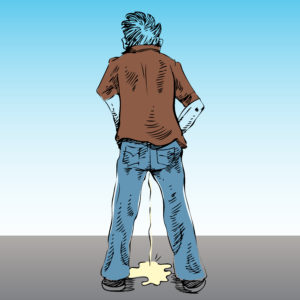Slow Urine Stream and Difficulty Urinating in Men and Women
If you have any questions, to schedule a consultation or if you need a second opinion, please contact us or call: 646-663-4151
At New York Urology Specialists you can expect the most effective treatment approaches and high-quality urological care for your urinary problems. Our experienced urologists treat urinary problems in men of all ages. We successfully treat urinary problems in men who are often told that they have no options.
What is the Cause of Slow Urine Stream?
The most common cause of slow urine stream is enlarged prostate or BPH. Other causes include urethral stricture, prostate cancer, UTI, bladder cancer and poorly functioning bladder.
 What is the Treatment for Slow Urine Stream?
What is the Treatment for Slow Urine Stream?
Treatment depends on the underlying cause. We are able to help almost every man who has difficulty emptying their bladder or slow urine stream. Please contact us for more information.
What Are the Causes for Slow Urine Stream?
Slow urine stream or urinary hesitancy (trouble starting or maintaining urination) is most common in older men with an enlarged prostate gland, but it can affect people of all ages and both sexes.
The problem is typically caused by urethral blockage or a small capacity bladder. It may also be caused by poorly functioning bladder detrusor muscle.
When the bladder capacity is small and it cannot hold much urine, oftentimes the bladder muscle cannot generate sufficient pressure to make a good urine stream possible. Most commonly, this occurs in patients with overactive bladder.
Patients with poorly functioning bladder muscles can also have slow urine stream and sometimes need to push on their lower abdomen to void. Poorly functioning bladder muscles may be the result of neurological problems, such as neuropathy from diabetes, multiple sclerosis, or other neurological conditions. The atonic bladder, or flaccid, or acontractile bladder refers to poorly functioning bladder muscles.
Most commonly, poorly functioning bladder detrusor muscle is the result of long-term strain on the muscle that is caused by bladder outflow obstruction in men with an enlarged prostate. While the bladder muscles can compensate by pushing harder for many years, eventually the muscles may wear off and not be able to push as hard. As a result, men experience urinary hesitancy, dribbling, and trouble maintaining a strong flow of urine.
Less Common Causes of Slow Urine Stream
Constipation, especially in patients who take narcotic medications, may sometimes be the reason for slow urinary stream. Urethral stricture is another cause of slow stream and is a more common cause in younger men.
Other causes include urethritis, prostatitis in men, cystitis in women, and urinary tract infections. The slow urine stream may also be caused by sexually transmitted diseases.
Some medications, such as cold and allergy remedies, antidepressants, medicines used to treat incontinence, and certain supplements and vitamins may cause this problem as well. An experienced urologist can work with a patient to figure out the cause of a slow urine stream.
Evaluation of Slow Urine Stream in New York City
The first question that needs to be answered in patients with this problem is whether their bladder empties completely. Typically, a bladder ultrasound or pelvic ultrasound is performed with a full bladder. The patient then urinates, and often, a Uroflow study is performed. Then the bladder is measured again and post-void residual volume is determined.
If the post-void residual volume of the bladder is elevated, that means the bladder does not empty completely, most likely due to urethral obstruction caused by an enlarged prostate or urethral strictures, and less commonly, by constipation or pelvic mass.
If the post-void residual volume is minimal and the amount voided a small, the patient is likely to have a small bladder capacity and overactive bladder, especially if the patient is young and there is no evidence of urethritis, UTI, or prostatitis. However, the same situation can be caused by urethral obstruction with an enlarged prostate, for example. An experienced urologist may need to do additional tests as well as use his or her clinical judgment to determine the most likely cause of the problem and to decide on the initial treatment.
Elevated post-void residual volume can be caused by neurological problems such as diabetes, stroke, spinal cord injury, pelvic organ prolapse, and BPH. Atonic or underactive bladder detrusor muscles can also lead to incomplete bladder emptying or urinary retention.
Services Performed at New York Urology Specialists for Evaluation and Treatment of Slow Urine Stream in Men and Women
- Pelvic ultrasound
- Postvoid residual
- Uroflow studies
- Cystoscopy
- Urodynamic studies
- InterStim neuromodulation
- Intravesical Botox injections
- Urolift for BPH
- Rezum therapy
- Water vapor therapy for enlarged prostate
- Prostate enucleation
- Holmium laser ablation of the prostate
- Urethroplasty for treatment of urethral strictures
Our experienced urologists have helped hundreds of men and women with slow urine stream and other urinary symptoms, such as incomplete bladder emptying, frequent urination, urinary urgency, and urinary incontinence to regain bladder control and improve quality of life. Schedule an appointment today with our board-certified urologists and see us in our Manhattan offices.
Why Choose New York Urology Specialists for Treatment of Suprapubic Catheter Tube Management?
- All treatment is performed by a Board-certified urologist experienced in treating men with symptoms of frequent urination, urinary urgency, urinary incontinence and bladder pain using medical therapy, minimally invasive therapies, lasers, and open surgery.
- We are one of the few practices in the region to offer a full range of options for treatment of urinary problems in men and women
- We offer treatment options for overactive bladder, UTI, and urinary incontinence in our office which avoids the risks, costs, and recovery from general anesthesia.
- Extensive Experience: Hundreds of men and women have treated successfully using medical therapy, Botox for overactive bladder, Interstim for frequent urination and tibial neuromodulation.

If you have any questions, to schedule a consultation or if you need a second opinion, please contact us or call: 646-663-4151
Medicare and major insurances accepted. We offer affordable rates and financing options.
|
If you have any questions, to schedule a consultation or if you need a second opinion, please contact us or call: 646-663-4151
We offer affordable, highest-quality urology care with or without insurance. Find out our office hours or directions to our office. We offer weekday, weekend, and evening office hours.
If you have any questions, to schedule a consultation or if you need a second opinion, please contact us or call: 646-663-4151
Dr. Alex Shteynshlyuger is a board-certified urologist in NYC who specializes in treating men and women with urinary problems including frequent urination, difficulty emptying the bladder, urinary urgency and incontinence.

 What is the Treatment for Slow Urine Stream?
What is the Treatment for Slow Urine Stream? Schedule an Appointment with Dr. Shteynshlyuger:
Schedule an Appointment with Dr. Shteynshlyuger:

